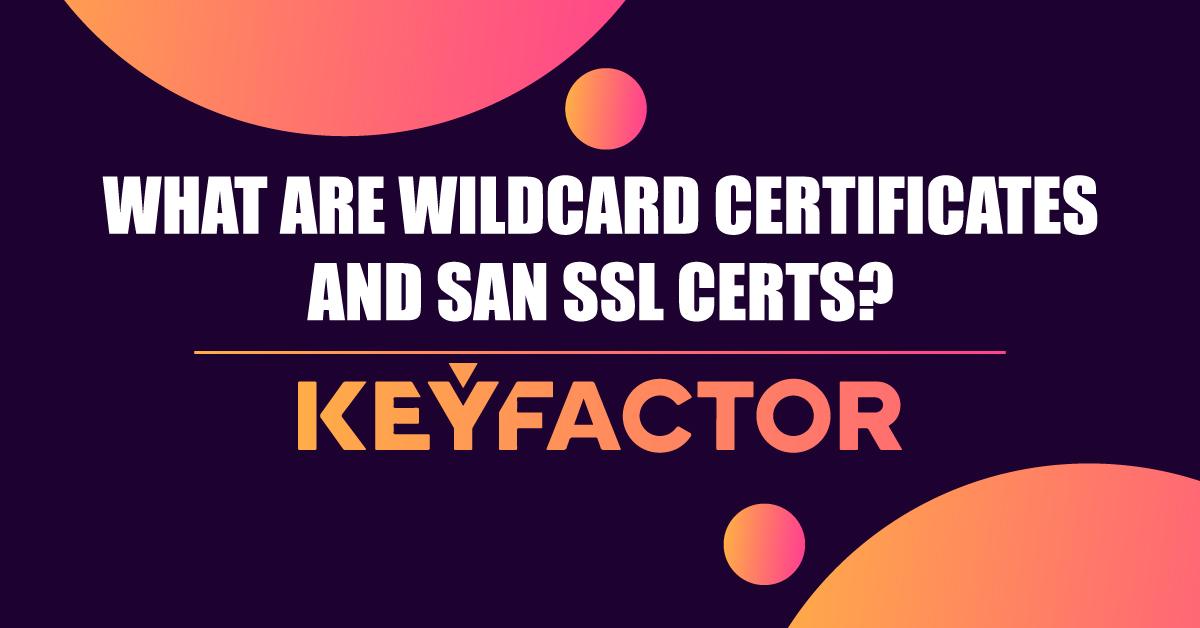The Wildcard and SAN SSL certificates are touted as the two most promising security solutions. If you have no clue about SSLs and how they work, you’d assume it to be yet another sales pitch.
If that’s how you feel about these premium SSLs, then read on. Picking the right SSL is serious business because one wrong step could end up exposing your website to vulnerabilities and take down your business.
Also, it could lead to loss of reputation and potential earnings due to the lack of trust that comes with an SSL certificate. Currently, most leading browsers shoot out security warnings when users try to access websites that run without an SSL or have the wrong SSL type.
There is no one-size-fits-all in the world of SSL because every website is different and has its unique requirements. Therefore, the choice of the SSL must be made based on certain key factors that we shall soon discuss.
What is a Wildcard SSL?
A Wildcard SSL encrypts all the subdomains of a fully qualified domain name (FQDN), also known as the primary domain. It is a one-stop solution for businesses with several subdomains such as login, cart, payments, blog, and so on.
In the internet space, each subdomain is treated as a distinct domain and must be encrypted beyond a domain validated (DV) or standard SSL capacity. These are the SSLs you get for free with the hosting packages.
However, you usually get only one free DV SSL certificate which you are most likely to install on the primary domain. You would have to buy more DV SSLs — one for every subdomain and install it every time you create a subdomain.
Since you might create them from time to time, you will also have to keep track of every DV SSL’s validity.
None of this would bother you when you opt for a Wildcard SSL because this type of SSL comes with the wildcard character (*), which encrypts all the subdomains by default.
It is a cheaper and convenient solution for website owners as they would have to track and renew a single SSL. Moreover, many cheap wildcard SSL certificate providers offer steep discounts on certificates issued by reputed Certificate Authorities.
How does the Wildcard SSL work?
Before we understand how a Wildcard SSL works, you need to know how an SSL works. The SSL/TLS certificate works by encrypting communication between the client and the server. Imagine entering your login details on a website that does not have an SSL/TLS installed.
In this case, the username and password can be intercepted and even manipulated by cybercriminals. This happens when the data moves between the client and the server.
An SSL prevents that by using cryptographic keys that make this in-transit data illegible to anyone other than the intended recipient. In the case of a DV SSL, it can do this only for the data transmitted from a primary domain to the client.
However, the Wildcard certificate is a more comprehensive solution with the wildcard character that lets you encrypt client-server communication from every subdomain of a primary domain. This includes your current subdomains and all the future subdomains you create throughout the Wildcard SSL’s validity.
With a Wildcard SSL issued for *.awebsite.com, you can encrypt the following:
login.awebsite.com
cart.awebsite.com
payment.awebsite.com
But not
user.login.awebsite.com
admin.login.awebsite.com
That is because the above two subdomains are on a different level.
Understanding the need for a Wildcard SSL certificate
Any business or individual who has a website with subdomains and is desirous of lowering SSL administration costs can greatly benefit from a Wildcard SSL. It also minimizes the possibilities of internal threats as only one private key would be involved.
This is important because over 66% of organizations believe that there is a greater possibility of insider threats than external elements. About 2500 businesses in the US are believed to fall prey to internal threats daily.
Despite all the good stuff that we have discussed, the Wildcard SSL certificate is only suitable for organizations operating through a single primary domain. For others, there is yet another readily available solution which we shall now discuss.
What is a SAN SSL?
The Subject Alternative Name (SAN) or the Unified Communication Certificate (UCC) is a multi domain SSL that is best suited for larger businesses. It lets the user encrypt multiple domains, subdomains, IPs, mail servers, and more. That makes it ideal for larger businesses with advanced requirements.
When do I need a SAN SSL?
If your business uses multiple domains or IP addresses, the SAN SSL would be the ideal fit. Also, it is suitable for single-domain businesses that make use of subdomains at different levels. Unlike the Wildcard, SAN certificates let you encrypt them effortlessly. However, the SAN SSL certificates come with capping, and you must pick one that can encrypt all your domains, subdomains, and IPs.
Wildcard SAN SSL
You can get the best of both worlds in the form of a multidomain wildcard SSL, also known as the wildcard SAN SSL. It is a hybrid of the two SSL types we have just discussed and lets users encrypt multiple primary domains, their subdomains at different levels, and their IPs. Thus, making it ideal for ambitious entrepreneurs that keep trying out new ventures.
In this case, you can encrypt the following:
www.YourDomain.com
login.YourDomain.com
my.login.YourDomain.com
www.YourDomainName.com
login.YourDomainName.com
my.login.YourDomainName.com
Final Takeaway
While choosing an SSL type for your business, you must focus on two key factors — the number of websites and their architecture. We have highlighted some of the common features offered by most SAN and Wildcard SSL certificate providers, but these may vary from one seller to another.
Make it a point to go through the offer in detail, particularly while choosing a SAN or a multi domain SSL that comes without the wildcard feature.




















![TamilMV Proxy List Top 30+ [Unblock TamilMV Sites] TamilMV Proxy Unblock](https://technewsgather.com/wp-content/uploads/2023/04/17825836_SL-121019-25870-14-1-100x70.jpg)